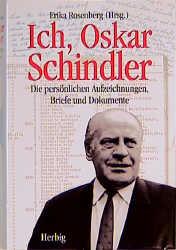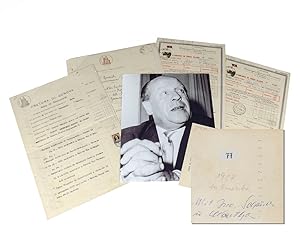oskar schindler von schindler (8 Ergebnisse)
FeedbackSuchfilter
Produktart
- Alle Product Types
- Bücher (8)
- Magazine & Zeitschriften (Keine weiteren Ergebnisse entsprechen dieser Verfeinerung)
- Comics (Keine weiteren Ergebnisse entsprechen dieser Verfeinerung)
- Noten (Keine weiteren Ergebnisse entsprechen dieser Verfeinerung)
- Kunst, Grafik & Poster (Keine weiteren Ergebnisse entsprechen dieser Verfeinerung)
- Fotografien (Keine weiteren Ergebnisse entsprechen dieser Verfeinerung)
- Karten (Keine weiteren Ergebnisse entsprechen dieser Verfeinerung)
- Manuskripte & Papierantiquitäten (Keine weiteren Ergebnisse entsprechen dieser Verfeinerung)
Zustand
Einband
Weitere Eigenschaften
Sprache (2)
Gratisversand
Land des Verkäufers
Verkäuferbewertung
-
Zur Erinnerung an Oskar Schindler, dem unvergeßlichen Lebensretter 1200 verfolgter Juden. Dokumentation der Gedenkstunde zum 10. Todestag am 14. Oktober 1984 in Frankfurt am Main.
Verlag: Frankfurt am Main ,, 1985
Anbieter: Antiquariat Robert von Hirschheydt, Wedemark, Deutschland
Verbandsmitglied: BOEV
EUR 15,00
Währung umrechnenEUR 10,00 für den Versand von Deutschland nach USAAnzahl: 1 verfügbar
In den Warenkorb52 Bl., DIN A 4, kart., guter Zustand! - Die Ackermann-Gemeinde ist die Gemeinschaft sudetendeutscher Katholiken.
-
Ich, Oskar Schindler: Die persönlichen Aufzeichnungen, Briefe und Dokumente
Anbieter: Bookbot, Prague, Tschechien
EUR 10,37
Währung umrechnenEUR 11,99 für den Versand von Tschechien nach USAAnzahl: 1 verfügbar
In den WarenkorbZustand: As New.
-
Ich, Oskar Schindler : die persönlichen Aufzeichnungen, Briefe und Dokumente ; mit zahlr. faks. Dokumenten.
Verlag: München : Herbig, 2000
Anbieter: Antiquariat + Buchhandlung Bücher-Quell, Greifenstein-Allendorf, Deutschland
EUR 16,00
Währung umrechnenEUR 13,90 für den Versand von Deutschland nach USAAnzahl: 1 verfügbar
In den Warenkorb448 S. Mit 35 Fotos. Gr. 8°. OPpbd. mit SU. Zustand: gut.
-
Ich, Oskar Schindler : die persönlichen Aufzeichnungen, Briefe und Dokumente ; mit zahlreichen faksimilierten Dokumenten. Erika Rosenberg (Hrsg.) / Teil von: Anne-Frank-Shoah-Bibliothek
Anbieter: Schürmann und Kiewning GbR, Naumburg, Deutschland
EUR 14,95
Währung umrechnenEUR 15,00 für den Versand von Deutschland nach USAAnzahl: 1 verfügbar
In den WarenkorbGewebe. Zustand: Sehr gut. 448 S. : Ill. ; 23 cm Sprache: Deutsch Gewicht in Gramm: 866.
-
Ich, Oskar Schindler ? Die persönlichen Aufzeichnungen, Briefe und Dokumente
Verlag: F. A. Herbig Verlagsbuchhandlung, München, 2000
ISBN 10: 3776622040 ISBN 13: 9783776622041
Sprache: Deutsch
Anbieter: Antiquariat Hans Wäger, Werther, Deutschland
EUR 8,95
Währung umrechnenEUR 31,40 für den Versand von Deutschland nach USAAnzahl: 1 verfügbar
In den WarenkorbHardcover. Zustand: gut. - Sehr guter Zustand - In deutscher Sprache. 448 S. pages. 23 x 15 cm.
-
EUR 25,00
Währung umrechnenEUR 48,99 für den Versand von Deutschland nach USAAnzahl: 2 verfügbar
In den WarenkorbZustand: New. -/- Prof. Erika Rosenberg hat u.a. Biographien ueber Oskar und Emilie Schindler verfasst. 1990 lernte sie Emilie Schindler in Buenos Aires kennen und betreute sie bis zu ihrem Tod 2001. Seit dem Tag bewahrt sie Schindlers Erbe.Er.
-
Oskar Schindler - der Mensch und sein Werk. Eine Biographie mit dokumentarischem Anhang und Bildern. Zum Gedenken an Oskar Schindler anläßlich seines 25. Todestages am 9. Oktober 1999.
Verlag: [Alsfeld]. [1999]., [Walter Haupt], 1999
Anbieter: Rotes Antiquariat, Berlin, Deutschland
EUR 45,00
Währung umrechnenEUR 45,00 für den Versand von Deutschland nach USAAnzahl: 1 verfügbar
In den Warenkorb69, XXXI, 180 S., zahlr. Ill., Kt. 4°, OLn. mit OU. Mit Vorworten von Gernot Facius und Karin Wolff. Ein Blatt beim Literaturverzeichnis ist eingerissen, sonst guter Zustand. 1250 gr.
-
Oskar Schindler Document Collection.
Anbieter: Raptis Rare Books, Palm Beach, FL, USA
Erstausgabe Signiert
EUR 22.609,08
Währung umrechnenKostenlos für den Versand innerhalb von/der USAAnzahl: 1 verfügbar
In den WarenkorbRare collection of original documents primarily obtained by Oskar and Emilie Schindler in preparation for their post-WWII emigration to Argentina in 1949. The collection includes a color photograph of Schindler seated on a couch annotated by him on the verso, "1957 in Amerika", an Italian emigration certificate dated September 1949 authorizing Emilie Schindler to travel from Italy to Argentina, two boarding cards dated October 4, 1949 listing Oskar and Emilie Schindler as passengers aboard the Campagnia Genovese d'Armamento traveling from Genoa to Buenos Aires, legal certificates stating the Emilie had no criminal record, and a medical card for Emilie Schindler issued by the Delegacion of Argentina on October 10, 1949 with a small pocket on the verso containing a black and white X-Ray slide of her lungs. Oskar and Emilie exhausted their savings leasing and operating the German Enamelware Factory during World War II, which at its peak in 1944, employed over 1,000 Jews, saving them from deportation by the Gestapo. By the end of the war, Schindler had spent his entire fortune on bribes and black market purchases of supplies for his workers and in 1949, with financial help from a Jewish organization, he and Emilie moved to Argentina to begin a farming business. By 1957, the business went bankrupt and Schindler returned to West Germany alone. He never saw his Emilie again, although they remained married. In near fine condition. An exceptional collection. German industrialist and member of the Nazi party Oskar Schindler saved of nearly 1,200 Jews during the Holocaust by employing them in his enamelware and ammunitions factories in occupied Poland and the Protectorate of Bohemia and Moravia. In January 1940, with the financial backing of several Jewish investors, Schindler leased the German Enamelware Factory, which, at its peak in 1944, employed over 1,000 Jews. Initially, Schindler was mostly interested in the money-making potential of the business and hired Jews because they were cheaper than Polesâ"the wages were set by the occupying Nazi regime. Later he began shielding his workers without regard for cost. The status of his factory as a business essential to the war effort became a decisive factor enabling him to help his Jewish workers. Whenever Schindlerjuden (Schindler Jews) were threatened with deportation, he claimed exemptions for them. He claimed wives, children, and even people with disabilities were necessary mechanics and metalworkers. Schindler's heroics during World War II were immortalized in the famous 1993 film Schindler's List, produced by Steven Spielberg and written by Steven Zaillian.








